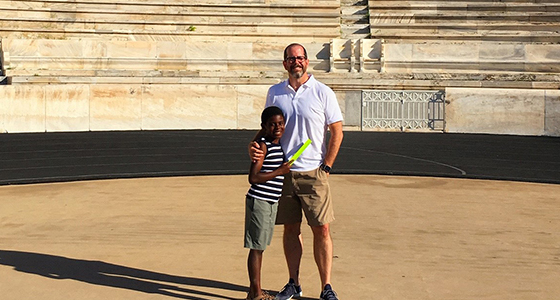
A Quest for Connectedness
A deep desire to work toward greater connectedness intensifies urgency and commitment for IFT’s newly appointed Diversity and Inclusion leader.

I am a proudly gay, recently divorced, often overwhelmed, single father in a trans-racial family, proudly parenting an incredible gender-diverse child. I was the first person in my family to graduate from college and am the youngest child of parents who divorced each other, twice. I prefer the pronouns he/him/his. I have lived in Russia, Ukraine, China, and Spain, and studied the language of each country (with varying results). I am a white cisgender Midwesterner from the geographic center of the United States. As a child, I had bedroom walls covered with photos of all the places I wanted to visit, torn from the pages of National Geographic. I am innately very shy but learned to overcome that by participating in theater as a child, which I reckon saved my life. I’ve spent the last 25 years trying to see as much of the world as I can with my own eyes, having visited over 60 countries on a quest for connectedness.
I joined IFT five years ago as the Senior Vice President for Strategy and Communications to lead various strategic initiatives. I was recently asked to take on the leadership of IFT’s diversity, inclusion, and equity initiatives and it has given my commitment to IFT and its mission new meaning and urgency. Nothing that I’ve led at IFT seems as important as this, or more connected to my own core values
I grew up in Topeka, Kansas. Sitting on the eastern edge of the Great Plains, Topeka is the last stop going west on I-70 before the Flint Hills take shape, followed shortly by the flattening of the land and the beginning of fields of wheat and the breadbasket of America.
Topeka is known for a few things. It is the capital of Kansas. For decades it was home to one of the most famous psychiatric institutes in the world, the Menninger Foundation. It played a central role in the desegregation of America’s public schools with the landmark U.S. Supreme Court case, Brown v. Topeka Board of Education, which overturned Plessy v. Ferguson. Sadly, in more recent times, Topeka has been most famous for an unaffiliated church, whose name I don’t write or speak aloud, well known as the leading U.S. hate group targeting the LGBTQ community.
Growing up gay in Topeka had its challenges, not the least of which was living in the same neighborhood as the aforementioned church and their daily protests on the corner of my street. Their signs containing hateful images and language, often attacking people I knew, haunted me. I remember living in fear that one day I may be the subject of one of their signs. I was reminded daily of the divisiveness of my secret identity, and the shame that many thought was my rightful burden to bear. Their signs very plainly said, “God Hates…” I can’t finish it.
I obviously survived in large part thanks to a loving, accepting family, a community theater program for youth, incredible friends, and relative privilege that gave me refuge and coverage. I also had a knack for blending in which enabled me, fortunately, to come out on my own terms. Some kids in my town were not so lucky. Like many kids across the U.S., not everyone had safety or acceptance at home, a sense of belonging, and the privilege that I enjoyed. And not everyone survived.
What I learned growing up in Topeka, that I still draw upon today, is the degree to which our survival is based on connectedness, belonging, and intentionally seeing one another through the lens of our human experiences, traumas, triumphs, intersectional identities, and the often messy and complicated paths each of us have taken to arrive in the present, having survived, and hopefully thrived.
As we enter this new decade, nothing seems more important to me than to work toward greater connectedness, for which diversity, inclusion, and equity are the most essential strategic ingredients. These terms can sometimes seem abstract. I’m aware that coming from someone like me, who enjoys a great deal of privilege by many measures, they can seem rhetorical or opportunistic. However, I am deeply devoted to progress, social justice, representation, and the very real work that needs to be done in pursuit of diversity, inclusion, and equity. I aim to demonstrate that and to be held accountable to that each and every day.
Meanwhile, IFT’s leaders have made it clear that IFT’s mission would remain unachieved unless the organization became deeply invested in taking action to advance diversity, inclusion, and equity. The scientists that were elected to lead this organization recognize that the work of our community to deliver a safe, sustainable, and nutritious food supply for everyone cannot be achieved unless everyone who shares that vision could be engaged in its pursuit. We have work to do.
The work of diversity, inclusion, and equity requires constant learning, introspection, being comfortable with being uncomfortable, and humbly asking for and accepting feedback. I look forward to speaking with IFT members and learning more about their perspectives and their experiences in IFT. Together, we will work toward a greater sense of connectedness and a heightened sense of mission as we advance the science of food and its application across the global food system.
For anyone with ideas, an expression of interest in being part of this initiative, or just a story to share, I welcome them at [email protected].
Eric Schneider, Senior Vice President for Strategy and Communications, IFT
